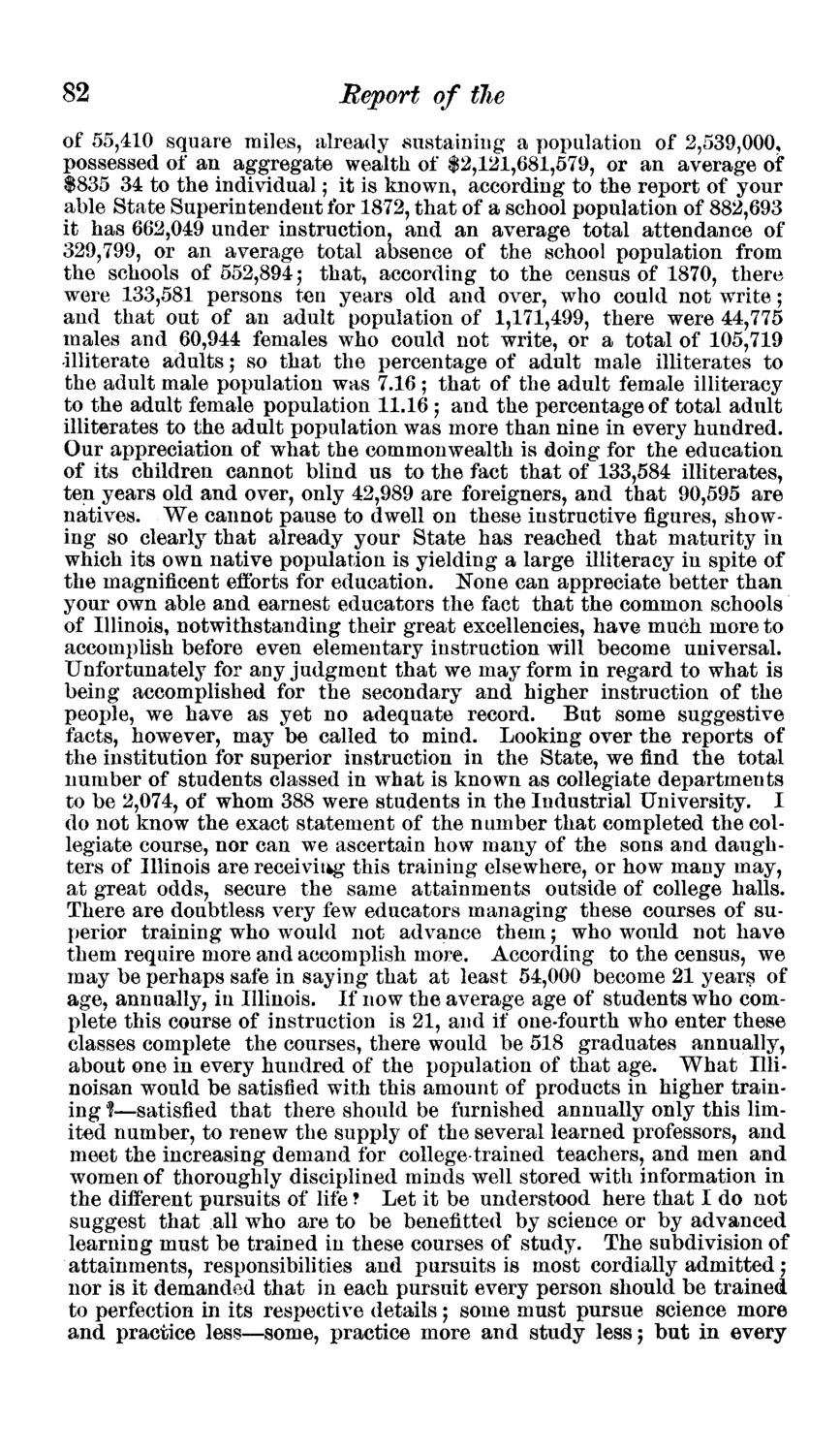| |
| |
Caption: Board of Trustees Minutes - 1874
This is a reduced-resolution page image for fast online browsing.

EXTRACTED TEXT FROM PAGE:
82 Report of tlie of 55,410 square miles, already vsustaining a population of 2,539,000, possessed of an aggregate wealth of $2,121,681,579, or an average of $835 34 to the individual; it is known, according to the report of your able State Superintendent for 1872, that of a school population of 882,693 it has 662,049 under instruction, and an average total attendance of 329,799, or an average total absence of the school population from the schools of 552,894; that, according to the census of 1870, there were 133,581 persons ten years old and over, who could not write; and that out of an adult population of 1,171,499, there were 44,775 males and 60,944 females who could not write, or a total of 105,719 illiterate adults; so that the percentage of adult male illiterates to the adult male population was 7.16 ; that of the adult female illiteracy to the adult female population 11.16; and the percentage of total adult illiterates to the adult population was more than nine in every hundred. Our appreciation of what the commonwealth is doing for the education of its children cannot blind us to the fact that of 133,584 illiterates, ten years old and over, only 42,989 are foreigners, and that 90,595 are natives. We cannot pause to dwell on these instructive figures, showing so clearly that already your State has reached that maturity in which its own native population is yielding a large illiteracy in spite of the magnificent efforts for education. None can appreciate better than your own able and earnest educators the fact that the common schools of Illinois, notwithstanding their great excellencies, have much more to accomplish before even elementary instruction will become universal. Unfortunately for any judgment that we may form in regard to what is being accomplished for the secondary and higher instruction of the people, we have as yet no adequate record. But some suggestive facts, however, may be called to mind. Looking over the reports of the institution for superior instruction in the State, we find the total number of students classed in what is known as collegiate departments to be 2,074, of whom 388 were students in the Industrial University. I do not know the exact statement of the number that completed the collegiate course, nor can we ascertain how many of the sons and daughters of Illinois are receiving this training elsewhere, or how many may, at great odds, secure the same attainments outside of college halls. There are doubtless very few educators managing these courses of superior training who would not advance them; who would not have them require more and accomplish more. According to the census, we may be perhaps safe in saying that at least 54,000 become 21 years of age, annually, in Illinois. If now the average age of students who complete this course of instruction is 21, and if one-fourth who enter these classes complete the courses, there would be 518 graduates annually, about one in every hundred of the population of that age. What Illinoisan would be satisfied with this amount of products in higher training ?—satisfied that there should be furnished annually only this limited number, to renew the supply of the several learned professors, and meet the increasing demand for college-trained teachers, and men and women of thoroughly disciplined minds well stored with information in the different pursuits of life ? Let it be understood here that I do not suggest that all who are to be benefitted by science or by advanced learning must be trained in these courses of study. The subdivision of attainments, responsibilities and pursuits is most cordially admitted; nor is it demanded that in each pursuit every person should be trained to perfection in its respective details; some must pursue science more and practice less—some, practice more and study less; but in every
| |